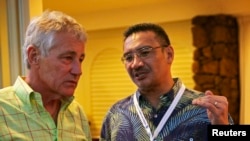U.S. Defense Secretary Chuck Hagel said the missing Malaysian jetliner will be a focus of this week's talks with Southeast Asian defense ministers in Hawaii.
Speaking Wednesday aboard a plane on his way to the summit, Hagel stopped short of criticizing Malaysia's handling of the incident, but said there are "always lessons to be learned."
"We're going to go back, the Malaysians will go back, all the ASEAN nations will go back and walk through this. What could have been done? Maybe what should have been done? Maybe what needs to be done better?" said Hagel.
The Boeing 777 mysteriously disappeared March 8 with 239 people on board. More than two dozen countries have participated in the search for the plane's wreckage in the Indian Ocean.
Geopolitics have complicated the search, with many analysts saying the the effort has exposed rivalries between Asian powers competing for military influence.
Hagel said the disaster highlights the importance of expanded regional defense cooperation and greater U.S. military involvement in Asia.
"I want those defense ministers after they leave Hawaii to feel even more clarity about U.S. commitment to the area, our coordination, our communication, the areas we can cooperate more and more and more and certainly humanitarian assistance, disaster relief is one [area]," said Hagel.
The U.S.-ASEAN Defense Forum is an informal meeting of defense chiefs from the 10 countries that make up the Association of Southeast Asian Nations. Following the summit, Hagel will visit Japan, China and Mongolia.
Hagel, who is making his fourth trip to Asia since becoming Pentagon chief, is tasked with helping carry out the Obama administration's economic and military "pivot" toward the Asia-Pacific.
In an opinion piece Wednesday on the Defense One website, Hagel said Washington remains committed to realizing the Asia rebalance. He promised the U.S. will continue to defend its allies and uphold international laws.
Speaking Wednesday aboard a plane on his way to the summit, Hagel stopped short of criticizing Malaysia's handling of the incident, but said there are "always lessons to be learned."
"We're going to go back, the Malaysians will go back, all the ASEAN nations will go back and walk through this. What could have been done? Maybe what should have been done? Maybe what needs to be done better?" said Hagel.
The Boeing 777 mysteriously disappeared March 8 with 239 people on board. More than two dozen countries have participated in the search for the plane's wreckage in the Indian Ocean.
Geopolitics have complicated the search, with many analysts saying the the effort has exposed rivalries between Asian powers competing for military influence.
Hagel said the disaster highlights the importance of expanded regional defense cooperation and greater U.S. military involvement in Asia.
"I want those defense ministers after they leave Hawaii to feel even more clarity about U.S. commitment to the area, our coordination, our communication, the areas we can cooperate more and more and more and certainly humanitarian assistance, disaster relief is one [area]," said Hagel.
The U.S.-ASEAN Defense Forum is an informal meeting of defense chiefs from the 10 countries that make up the Association of Southeast Asian Nations. Following the summit, Hagel will visit Japan, China and Mongolia.
Hagel, who is making his fourth trip to Asia since becoming Pentagon chief, is tasked with helping carry out the Obama administration's economic and military "pivot" toward the Asia-Pacific.
In an opinion piece Wednesday on the Defense One website, Hagel said Washington remains committed to realizing the Asia rebalance. He promised the U.S. will continue to defend its allies and uphold international laws.





